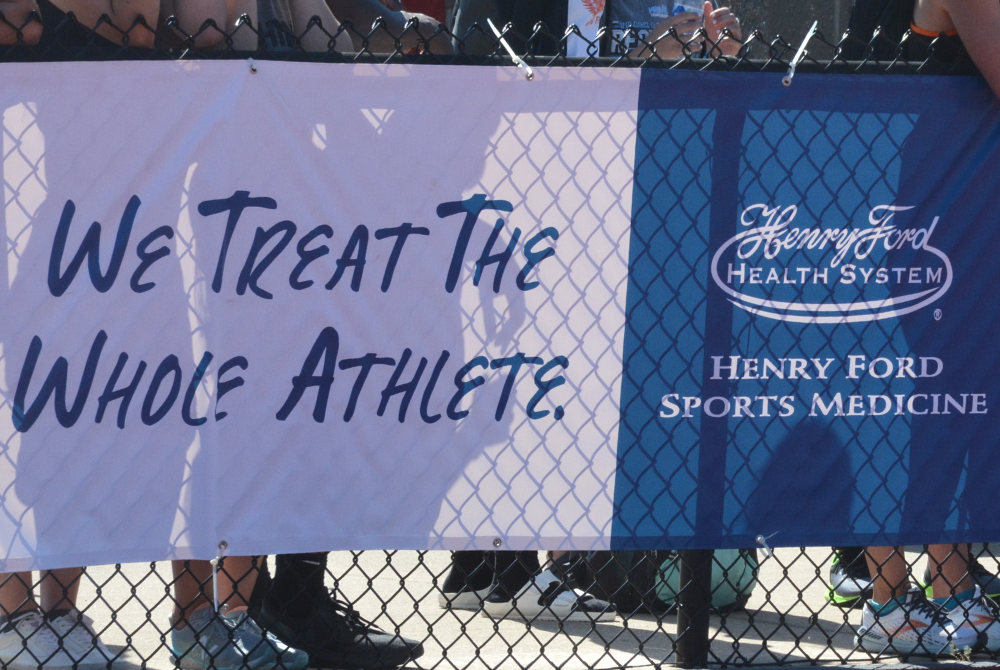
How Exercise Can Help Reduce Your Anxiety
January 6, 2022
Stress and anxiety at any level can be hard to manage. If you’re searching for relief, try turning to exercise. Even the smallest amount of physical activity can make a significant difference and reduce stress.
“Anxiety affects our minds and bodies. Exercise can serve as a natural antidepressant, boosting our mood at the same time it improves our health,” said Megan LaDrigue, ATC CSCS, an athletic trainer at Henry Ford Health System. “You don’t need to join a gym to exercise. The world is full of opportunities to be more active. You can add in short exercise sessions throughout the day to recharge your mood and energy.”
How Anxiety Impacts Your Health
If not addressed, anxiety can impact your mental and physical health. “Anxiety causes an imbalance in the chemicals and hormones that support our brain, immune system, digestive health and sleep,” said LaDrigue.
Chronic stress can lower our feel-good hormones – serotonin, dopamine and epinephrine. At the same time, the stress hormone cortisol increases when we’re under pressure or anxious. As a result of these shifts, you may experience:
► Trouble concentrating and loss of productivity at work or school
► Irritability and moodiness
► Difficulty sleeping
► Weight gain and digestive problems
► High blood pressure and increased risk for other diseases
How Exercise Can Break The Stress Cycle
“By adding exercise into your daily routine, you can begin to manage anxiety and improve your overall health,” said Ladrigue. Exercise offers many benefits, including:
► Shifting your focus: Focusing on your physical activity is a chance to take a mental break from daily tasks and recharge.
► Improving mood and confidence: When you exercise, your heart contracts more frequently, increasing blood flow to the brain and triggering changes in those feel-good chemicals. These changes improve mood and confidence. Over time, exercise can also help build resilience by increasing your ability to tolerate stress.
► Enhancing concentration and productivity: Exercise activates the areas in the brain that control how we think and act. For example, physical activity can improve your ability to plan, organize and monitor behavior and tasks.
► Improving sleep: Fatigue can increase feelings of stress and anxiety, which increase your risk for insomnia or poor sleep. Exercise improves your ability to get the quality, restorative sleep that you need to recharge your mind and body.
3 Steps To Starting An Anxiety-Fighting Exercise Routine
The U.S. Department of Health and Human Services recommends adults get 150 minutes of moderate exercise per week. “But you don’t need to do all of that exercise at once. If you’re just getting started, gradually build exercise into your daily routine to create a healthy habit,” LaDrigue said.
Ladrigue recommends these three steps to build an anxiety-busting fitness routine:
- Make it fun: Whether it’s walking or weightlifting, if exercise doesn’t inspire you and make you feel good, it won’t help you manage anxiety. If being social helps motivate you, find a workout buddy and encourage each other to keep moving. Explore new types of exercise by taking an online or in-person fitness class.
- Create a flexible schedule: If finding time in your day to exercise adds to your stress, try working in shorter activity periods. Do some stretches while you’re waiting for the coffee to brew. Take a walk during lunch or while you’re talking on the phone. Use the stairs instead of the elevator. Park your car farther away from your destination and walk the extra distance.
- Set goals: Start by setting short-term goals for your fitness routine. Record your progress to stay focused and motivated. As exercise becomes a daily habit, set longer-term goals. For example, try a community walk or run, join a hiking club or participate in a local sports league.
Build An Effective Workout Plan
If you’re new to exercise or have an underlying health condition, check with your primary care physician before starting a fitness routine. Had an injury in the past? See a physical therapist or sports medicine provider to avoid future injuries.
If you’ve taken a break from exercise or are exercising for the first time, start slowly. Over time, you can gradually increase the time and intensity of your workout to meet your goals.
When picking an exercise program, Ladrigue suggests including these elements:
► Warm up: Start with five minutes of activity like jumping jacks or running in place to increase the blood flow to your muscles.
► Dynamic stretching: Gently move through small or large ranges of motion to elongate the muscle tissue. For example, you can try arm circles or walking quad stretches to get your muscles warmed up.
► Strength training: If you’re new to strength training, start with light weights. You can start with three sets of 10 repetitions for each muscle group. Combine sets for a muscle group on the front of the body immediately followed with a set for a muscle group on the back of the body, like biceps and triceps. This approach is called “super-setting.” It keeps your heart rate elevated while giving the working muscle group time to recover. It also increases your metabolic burn, the rate at which you burn calories during exercise.
► Aerobic activity: Choose from a variety of activities, like walking, running, biking, swimming or dancing. Light- to moderate-intensity exercise can help you recover at the end of a strength training workout while increasing oxygen and blood flow to the working tissues.
► Cool down: Hold stretches for 20 to 30 seconds to elongate the muscle tissue used in your workout. This type of stretching helps prevent or minimize soreness.
“While starting a new habit like exercise can seem daunting, stay positive. Feel empowered – you’re taking steps that will improve your overall mental and physical health for years to come,” said LaDrigue.
To find a primary care or sports medicine specialist at Henry Ford, visit henryford.com or call 1-800-436-7936.
Megan LaDrigue is an athletic trainer who works with the Henry Ford Sports Medicine Sports Performance Program.

Why Athletes Should See A Sport Psychologist
By
Elizabeth Swanson
Henry Ford Health
January 9, 2024
Whether at the professional or intramural level, there are so many benefits to being an athlete. Participating in a sport teaches communication skills, how to overcome adversity—and regular exercise has so many incredible health effects on the mind and body.
 But that’s not to say athletes don’t have their own set of challenges. Pressures to perform, physical injuries and intense schedules can take a toll on anyone’s mental health, which is where a sport psychologist comes in.
But that’s not to say athletes don’t have their own set of challenges. Pressures to perform, physical injuries and intense schedules can take a toll on anyone’s mental health, which is where a sport psychologist comes in.
“It’s helpful that a sport psychologist knows the culture of athletics and the typical stressors that athletes face,” says Seth Swary, Ph.D., a sport psychology clinician at the Henry Ford Center for Athletic Medicine. “We’re familiar with the influence the world of athletics can have on someone and how it can affect their well-being.
“Athletes have a whole team around them to help them perform — athletic trainers, nutritionists, etc.— so why shouldn’t they have an expert who is dedicated to supporting their mental health? A sport psychologist acts as a strength-training coach for the mind.”
Mental Health Challenges That Athletes Face & How Sport Psychology Can Help
Athletes often have a built-in support system: teammates and coaches who know what they’re going through and trainers and physicians who can help manage aches and injuries. But still, it’s not always easy. Some of the difficulties that athletes face include:
- Increased attention on body image. Especially if you play a sport that requires revealing outfits — or a sport with increased focus on weight — it might be difficult to maintain a healthy body image. For some, this can lead to an increased risk of developing an eating disorder.
- The pressure to perform. “If you’re an athlete at the college or professional level and play badly during a game, you get roasted on Twitter,” says Dr. Swary. “But even if you’re not in the public eye, there is pressure to perform — from coaches, teammates, family members.”
- Navigating demanding schedules. “I work with many college athletes and their schedules are packed — practicing at least two hours a day, team meetings, traveling to and from games — and then they’re trying to keep up with school,” says Dr. Swary. “It can be stressful.”
- Debilitating physical injuries. The physical demand of sports can also bring about its own set of challenges — especially when injuries occur. “You’re not only dealing with surgery and rehabilitation, but you’re also out of the game for a while,” says Dr. Swary.
- Making career transitions. “I’ve worked with many athletes who are transitioning from one level of athletics to another (for example, middle school to high school, high school to college, college to professional) along with athletes who are transitioning out of their career,” says Dr. Swary. “They wonder how they can leave this sport they’ve been doing their whole lives — some since they were 3 or 4 years old. It can be a huge part of their identity and a tough transition to make. Even more so if it’s an injury that abruptly derails their career. We can provide them with ways to make a smooth, healthy transition.”
That said, nothing “bad” has to happen to benefit from sport psychology. As Dr. Swary says, you don’t see a personal trainer because you’re not strong, you see a personal trainer because you could benefit from being stronger. It’s the same with sport psychology — and it can help improve your performance.
“We have specific skills we work on for performance optimization,” says Dr. Swary. “How do we talk to ourselves? How do we respond in certain situations? How do we stay in the moment when we’re distracted?
“A high school athlete may have had a rough day at school; then they have to refocus and find energy at the end of the day for their game. It can be helpful for any athlete at any time.”
Reviewed by Seth Swary, Ph.D., a sport psychology clinician at the Henry Ford Center for Athletic Medicine.
To learn more about the sport psychology program at Henry Ford or to request an appointment, visit henryford.com/sportpsychology.


